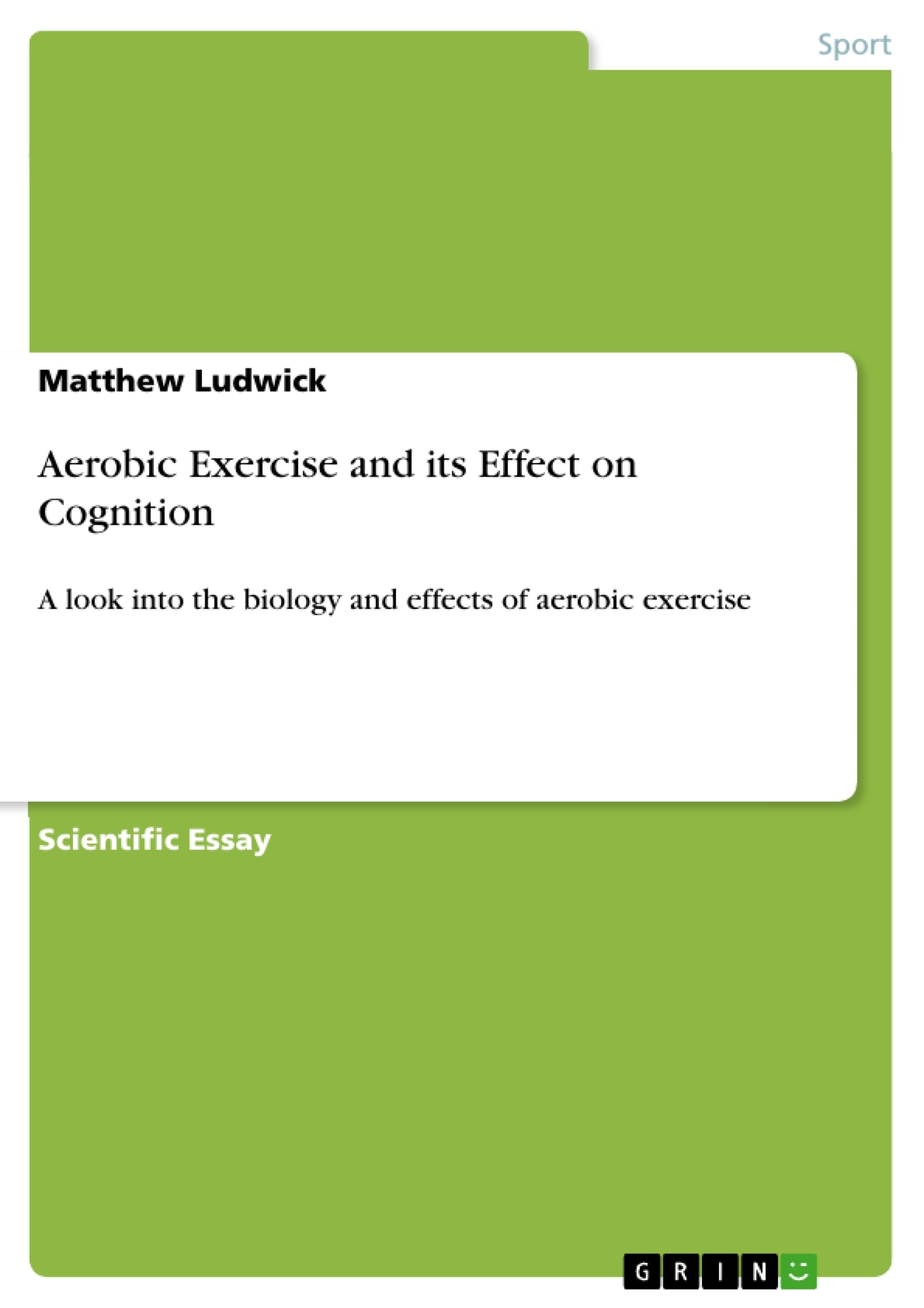Aerobic exercise has always been known to be good for the body. It tones and strengthens muscles, increases the number of mitochondria in cells, and releases neurotransmitters like dopamine and serotonin into the bloodstream. Most individuals who partake in aerobic exercise consistently report improved mood and disposition, most likely due to the hormone release and improved self image (Steptoe & Cox 1988). What most people do not think of is what other effects aerobic exercise can have on the human body.
The brain, formerly thought to never grow new cells or increase in size after adulthood has been found to not only grow in size in certain areas but also improve thinking power and reaction times after moderate aerobic exercise. This paper will explore the biology behind this phenomenon and some of the implications of this finding.
Inhaltsverzeichnis (Table of Contents)
- Introduction
- Aerobic Exercise and Brain Function
- Benefits of Aerobic Exercise on Cognition and Memory
- Aerobic Exercise and Mental Health
- Animal Studies on Aerobic Exercise and Brain Function
- Aerobic Exercise and the Elderly
- The Mechanisms Behind the Effects of Aerobic Exercise
- Insulin-like Growth Factor I (IGF-I)
- Endorphins and Migraines
- Brain-Derived Neurotrophic Factor (BDNF)
- Conclusion
Zielsetzung und Themenschwerpunkte (Objectives and Key Themes)
This paper explores the positive impact of aerobic exercise on brain function, specifically focusing on its influence on cognition, memory, and mental health. The author delves into the biological mechanisms responsible for these effects, highlighting the roles of growth factors, endorphins, and brain-derived neurotrophic factor.- The benefits of aerobic exercise on cognitive function and memory.
- The relationship between aerobic exercise and mental health, particularly regarding depression.
- The underlying biological mechanisms involved in aerobic exercise's positive effects on the brain, including growth factors, endorphins, and brain-derived neurotrophic factor.
- The particular significance of aerobic exercise for the elderly and those at risk for conditions like Alzheimer's and dementia.
- The ongoing research into the complex interplay between aerobic exercise and brain function.
Zusammenfassung der Kapitel (Chapter Summaries)
This paper explores the relationship between aerobic exercise and brain function, particularly focusing on its impact on cognitive abilities, memory, and mental health. The author argues that aerobic exercise, characterized by increased heart rate and blood flow to the brain, provides numerous benefits beyond physical fitness. The paper presents evidence from various studies highlighting the positive effects of aerobic exercise on cognitive function. These studies show that aerobic exercise can lead to improvements in long-term potentiation, reaction times, and overall cognition. The paper also examines the role of aerobic exercise in mitigating depression, citing a study demonstrating its effectiveness in reducing depression and stress levels in clinically diagnosed patients. The paper further delves into the biological mechanisms underlying the positive effects of aerobic exercise on the brain. It discusses the role of insulin-like growth factor I (IGF-I), suggesting that its release during exercise contributes to neurogenesis and protection against the aging process. The paper also explores the role of endorphins, specifically focusing on their ability to reduce migraine symptoms and provide pain relief. The author highlights the influence of brain-derived neurotrophic factor (BDNF) on synaptic transmission, gene transcription, and overall brain performance, emphasizing its role in promoting brain plasticity. The paper concludes by underscoring the importance of aerobic exercise for the elderly and those at risk for brain conditions like Alzheimer's and dementia, arguing that aerobic exercise can reverse brain loss and improve overall brain function.Schlüsselwörter (Keywords)
This paper focuses on the impact of aerobic exercise on brain function, with specific emphasis on cognition, memory, mental health, and the underlying biological mechanisms responsible for these effects. Key concepts discussed include: * **Aerobic exercise:** Activities that increase heart rate and blood flow to the brain. * **Cognitive function:** Mental processes such as thinking, memory, and learning. * **Brain plasticity:** The brain's ability to change and adapt over time. * **Neurogenesis:** The creation of new neurons in the brain. * **Growth factors:** Molecules that promote cell growth and differentiation. * **Endorphins:** Hormones that reduce pain and enhance feelings of well-being. * **Brain-derived neurotrophic factor (BDNF):** A protein that supports neuron survival and growth. * **Alzheimer's disease:** A neurodegenerative disease characterized by memory loss and cognitive decline. * **Dementia:** A general term for a decline in cognitive function.Frequently Asked Questions
How does aerobic exercise affect brain size and function?
Contrary to old beliefs, the brain can grow in certain areas and improve thinking power and reaction times after moderate aerobic exercise.
What is the role of BDNF in brain health?
Brain-Derived Neurotrophic Factor (BDNF) is a protein that supports neuron survival and growth, promoting brain plasticity and overall performance.
Can aerobic exercise help with mental health issues like depression?
Yes, studies show that aerobic exercise can effectively reduce depression and stress levels, often improving mood due to hormone release like dopamine and serotonin.
Why is exercise particularly important for the elderly?
It can help reverse brain loss and protect against the aging process, reducing the risk of conditions like Alzheimer's and dementia.
What biological mechanisms are triggered by aerobic exercise?
Key mechanisms include the release of Insulin-like Growth Factor I (IGF-I) for neurogenesis and endorphins for pain relief and migraine reduction.
- Citation du texte
- Matthew Ludwick (Auteur), 2009, Aerobic Exercise and its Effect on Cognition, Munich, GRIN Verlag, https://www.grin.com/document/210866



